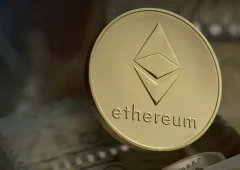New Reward-Bearing Synthetic Dollar Launches on Bybit
31.07.2024 10:30 1 min. read Alexander Stefanov
Ethena Labs is set to introduce USDe, a new type of collateral that not only serves as stable margin but also earns rewards, on the Bybit exchange starting August 2.
This innovative feature is expected to change how traders manage their collateral by offering daily reward payouts.
With USDe, Bybit users can earn up to 20% APR on their holdings, whether they are simply holding the stablecoin or using it as collateral for trading.
This new offering could significantly alter trading practices by allowing traders to potentially offset their costs with the rewards from their collateral. Given that over $30 billion is currently used as USD collateral for margining without additional benefits, this development could improve capital efficiency in the trading space.
Additionally, USDe transactions will be fee-free on the USDe/USDT and USDe/USDC pairs. The integration aims to establish USDe as a major player in the stablecoin market, providing a new tool designed specifically for crypto traders.
Since launching USDe and its initial Shard Campaigns, Ethena Labs has seen its TVL grow rapidly, reaching $2.11 billion in just 57 days. The further integration of USDe into Bybit’s trading options has led to an additional $1.3 billion in TVL, demonstrating significant momentum and impact within the decentralized finance sector.
-
1
Polygon Breaks from Decentralization as Sandeep Nailwal Assumes Full Control
11.06.2025 20:00 2 min. read -
2
Nvidia CEO Urges UK to Invest in AI Infrastructure or Risk Falling Behind
10.06.2025 9:00 1 min. read -
3
KuCoin Plants Its Flag in Bangkok With a Licensed Thai Exchange
14.06.2025 13:00 1 min. read -
4
Why Gold Could Be the Smart Play Amidst US Debt Surge
11.06.2025 11:00 1 min. read -
5
NFTs Quietly Evolve Into Core Digital Infrastructure
13.06.2025 17:00 2 min. read
Coinbase Surges 43% in June, Tops S&P 500 After Regulatory Wins and Partnerships
Coinbase has emerged as the best-performing stock in the S&P 500 for June, climbing 43% amid a surge of bullish momentum driven by regulatory clarity, product innovation, and deeper institutional interest in crypto.
What Brian Armstrong’s New Stats Reveal About Institutional Crypto Growth
Coinbase CEO Brian Armstrong has spotlighted a significant acceleration in institutional crypto adoption, driven largely by the surging popularity of exchange-traded funds and increased use of Coinbase Prime among major corporations.
Whales Buy the Dip as Retail Panics: This Week in Crypto
The latest market turbulence, fueled by geopolitical tensions and investor fear, offered a textbook case of how sentiment swings and whale behavior shape crypto price action.
What Will Happen With the Stock Market if Trump Reshapes the Fed?
Jefferies chief market strategist David Zervos believes an upcoming power shift at the Federal Reserve could benefit U.S. equity markets.
-
1
Polygon Breaks from Decentralization as Sandeep Nailwal Assumes Full Control
11.06.2025 20:00 2 min. read -
2
Nvidia CEO Urges UK to Invest in AI Infrastructure or Risk Falling Behind
10.06.2025 9:00 1 min. read -
3
KuCoin Plants Its Flag in Bangkok With a Licensed Thai Exchange
14.06.2025 13:00 1 min. read -
4
Why Gold Could Be the Smart Play Amidst US Debt Surge
11.06.2025 11:00 1 min. read -
5
NFTs Quietly Evolve Into Core Digital Infrastructure
13.06.2025 17:00 2 min. read


